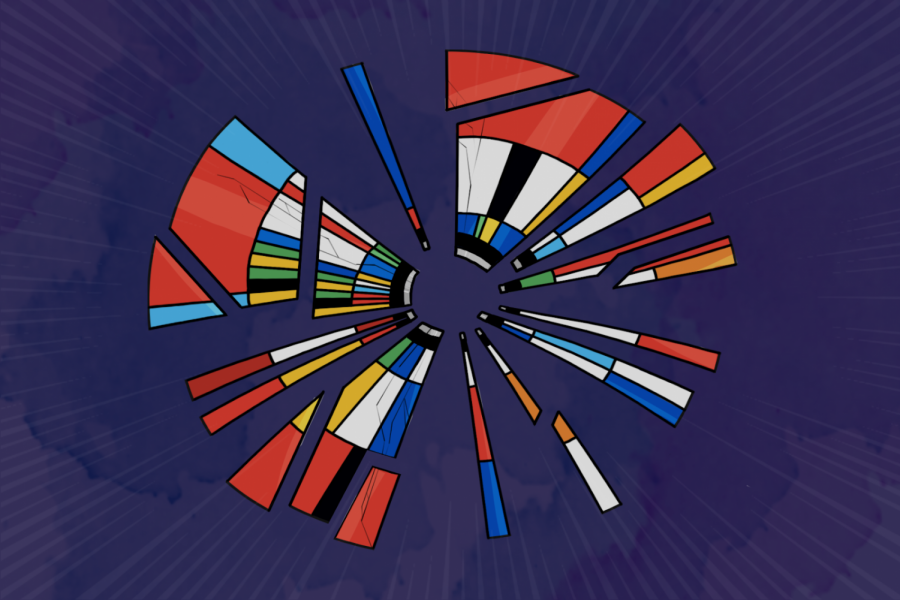Reenvisioning Eurovision
European song contest cancellation offers redemption for artists
Eurovision is a yearly song competition in which various European countries submit a song and an artist to represent them, as they perform live in the previous winner’s country. Though this year’s Eurovision was canceled due to the COVID-19 pandemic, The Sidekick executive sports editor Sally Parampottil explains why this is an opportunity rather than just a loss.
May 14, 2020
If there is one positive to the numerous event cancellations all over the globe, I would say it is how it gives a chance for the canceled 2020 Eurovision competitors to do better than what they planned on doing this year.
Eurovision is a European song contest in which each of the participating countries sends one representative (either a singer or a group) to compete by performing live. There are two semifinals followed by the Grand Final, where all results are decided based on the panel’s and countries’ votes, which tallies up into points.
I have listened to Eurovision since 2016, and it has always had incredible songs and artists. Each time, I experienced the sound of different countries’ songs and languages. I spent a few hours listening to artists I had never heard of before, and every year, it seemed like a great use of my time.
Until this year.
This year, the participants seemed to think to themselves, “How can we be as mediocre as possible?”
Then they did just that.
The pop-style songs seemed generic, the ballads seemed bland and the culturally based ones seemed uninspired. Songs with strong lyrics were washed away with lackluster melodies and those with a catchy tune had little substance. It was all entirely underwhelming – even the supposed frontrunners of the contest.
Lithuania’s entry, “On Fire” by The Roop was popular for its sound, but it still lacked meaning and power. Bulgaria, another popular candidate, sent “Tears Getting Sober” by Victoria; while the lyrics are beautifully sung and written with an elegant and airy sound, it did not stand out as anything new. One of my few favorites of the year was from the Czech Republic, with “Kemama” by Benny Cristo, though it gave off the energy of a World Cup song following a Kenya-inspired revamp. While I love the new version of the song, some of Cristo’s vocal abilities are lost amongst the new instrumental additions, making it less strong of an entry.
The closest thing to a winner I can see comes from Australia. Yes, I know Australia is not in Europe, and no, I do not have a clue why they compete in Eurovision. But Montaigne’s “Don’t Break Me” has a great combination of compelling lyrics, a well-composed backing track and unique vocals. Do I think it is a winning song? No. It is just the closest one there.
Too many contestants played it safe and did not push the boundaries of their music. After 2019’s incredible showing, including Italy’s “Soldi” by Mahmood – which held both a strong message and a memorable beat – and the winner, “Arcade” by Duncan Laurence from the Netherlands – one of the best examples of a ballad not being boringly presented – the following year just did not live up to its predecessor.
When the contest was canceled due to coronavirus concerns, I was a bit relieved. While I do feel bad for the contestants who put their hearts and souls into their performances (even if those performances did not wow me, you have to give them credit), I see this as a chance for redemption.
Eurovision permits this year’s contestants to compete again next year, but they will not be allowed to use the same songs. This is the perfect opportunity for these very talented artists to take a new approach to their music.
Eurovision is a way to connect with other cultures, not just within Europe, but all the way to Coppell. It is more than a competition; it is a celebration of culture and the arts. I hype up Eurovision every year, but if I were to recommend songs to someone wishing to broaden their musical horizon, I would not suggest a single song from 2020’s selection.
Come on, Europe (and Australia). Step up your game.
Follow Sally (@sparampottil) and @CHSCampusNews on Twitter.











